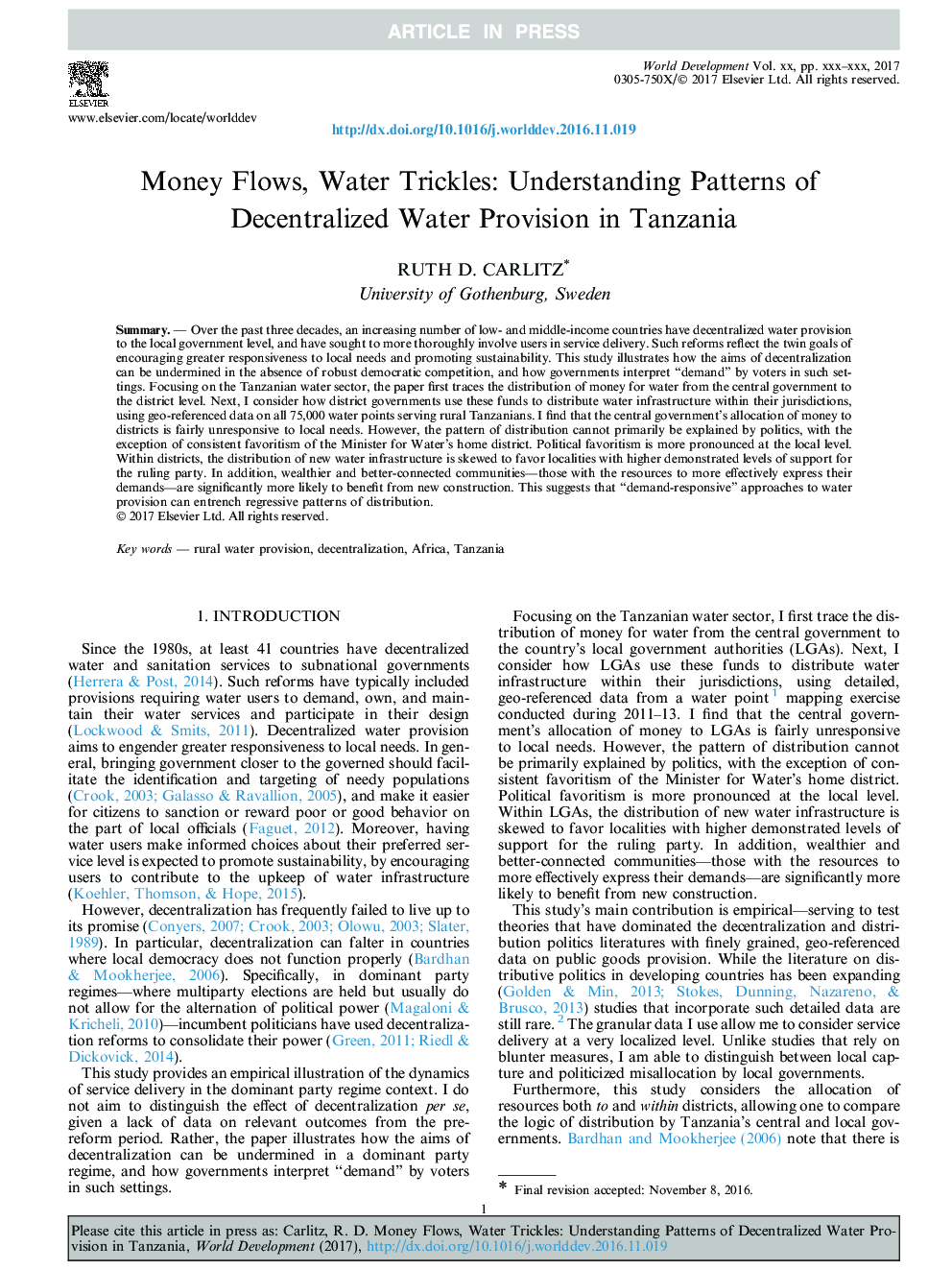| کد مقاله | کد نشریه | سال انتشار | مقاله انگلیسی | نسخه تمام متن |
|---|---|---|---|---|
| 5105290 | 1481125 | 2017 | 15 صفحه PDF | دانلود رایگان |
عنوان انگلیسی مقاله ISI
Money Flows, Water Trickles: Understanding Patterns of Decentralized Water Provision in Tanzania
ترجمه فارسی عنوان
جریان های پولی، جریان آب: درک الگوهای تامین آب دزدی در تانزانیا
دانلود مقاله + سفارش ترجمه
دانلود مقاله ISI انگلیسی
رایگان برای ایرانیان
کلمات کلیدی
تامین آب روستایی، تمرکززدایی، آفریقا، تانزانیا،
ترجمه چکیده
در طول سه دهه گذشته، تعداد روزافزونی از کشورهای کم درآمد و متوسط درآمد کم آب را به سطح دولت محلی اختصاص داده اند و به دنبال جذب بیشتر کاربران در ارائه خدمات بوده اند. چنین اصلاحات، اهداف دوگانه را تشویق می کند تا پاسخ بیشتر به نیازهای محلی و ترویج پایداری را نشان دهند. این مطالعه نشان می دهد که در غیاب رقابت قوی دموکراتیک اهداف تمرکززدایی می تواند تضعیف شود و اینکه دولت چگونه تفسیر می کند؟ توسط رای دهندگان در چنین تنظیمات. در این مقاله با تمرکز بر بخش آب تانزانیا، توزیع پول برای آب از دولت مرکزی به سطح ولسوالی انجام می شود. بعد، من در نظر می گیرم که چگونه دولت های منطقه از این وجوه برای توزیع زیرساخت های آب در حوزه های قضایی خود استفاده می کنند، با استفاده از داده های ارجاعی ژئوموردیکی در تمام 75000 نقطه آب تانزانیا در مناطق روستایی. من متوجه می شوم که تخصیص پول های مرکزی به ولسوالی ها نسبت به نیازهای محلی نسبتا غیرقابل پاسخ است. با این حال، الگوی توزیع نمی تواند به طور عمده توسط سیاست توضیح داده شود، به استثنای فریبندگی سازمانی وزیر امور خارجه منطقه آب. دموکراسی سیاسی در سطح محلی برجسته تر است. در میان ولسوالی ها، توزیع زیرساخت های آب جدید، به نفع مناطق است که سطح پشتیبانی از حزب حاکم را نشان می دهد. علاوه بر این، جوامع ثروتمند و متعهدتر نیز - کسانی که منابع بیشتری دارند، به طور موثر خواسته های خود را بیان می کنند - به طور قابل توجهی بیشتر از ساخت و ساز جدید بهره مند می شوند. این نشان می دهد که تقاضای پاسخگوئی رویکرد به تامین آب می تواند الگوهای رگرسیونی توزیع را تقویت کند.
موضوعات مرتبط
علوم انسانی و اجتماعی
اقتصاد، اقتصادسنجی و امور مالی
اقتصاد و اقتصادسنجی
چکیده انگلیسی
Over the past three decades, an increasing number of low- and middle-income countries have decentralized water provision to the local government level, and have sought to more thoroughly involve users in service delivery. Such reforms reflect the twin goals of encouraging greater responsiveness to local needs and promoting sustainability. This study illustrates how the aims of decentralization can be undermined in the absence of robust democratic competition, and how governments interpret “demand” by voters in such settings. Focusing on the Tanzanian water sector, the paper first traces the distribution of money for water from the central government to the district level. Next, I consider how district governments use these funds to distribute water infrastructure within their jurisdictions, using geo-referenced data on all 75,000 water points serving rural Tanzanians. I find that the central government's allocation of money to districts is fairly unresponsive to local needs. However, the pattern of distribution cannot primarily be explained by politics, with the exception of consistent favoritism of the Minister for Water's home district. Political favoritism is more pronounced at the local level. Within districts, the distribution of new water infrastructure is skewed to favor localities with higher demonstrated levels of support for the ruling party. In addition, wealthier and better-connected communities-those with the resources to more effectively express their demands-are significantly more likely to benefit from new construction. This suggests that “demand-responsive” approaches to water provision can entrench regressive patterns of distribution.
ناشر
Database: Elsevier - ScienceDirect (ساینس دایرکت)
Journal: World Development - Volume 93, May 2017, Pages 16-30
Journal: World Development - Volume 93, May 2017, Pages 16-30
نویسندگان
Ruth D. Carlitz,
